

A global archive of independent reviews of everything happening from the beginning of the millennium
Read our Copyright Notice click here
For publication dates click here
Little Girl Blue threads through time [1] with different interpretations, like Stars Fell on Alabama.
Outside Dusty Springfield's house on Boxing
Day
Joplin's Piece of My Heart is the same song as Take Another Little Piece of My Heart which Dusty Springfield recorded, too. Springfield's I Only Want To Be With You is one of the quintessential tracks of Britain in the sixties and so hard to transpose in time and place though Shelby Lynne records it well.
Springfield's Only A Little Lovin' was recorded in America, however, and Lynne excels in making a modern reference version of it, known for its sound quality and interpretation. All three singers are really good at producing emotional connection.
*****
Halloween Dogs
(A photo per song, impromptu)
This, by a little accident, has become the page where we comment on the music industry and the role of critics in it.
Per statement, there are more untruths told in the music industry than in politics, and less skillfully, but at least they do not kill, in most cases.
Suicides happen and criminal bullying as well. In the latter cases PR agencies need to be investigated as possible accessories.
It is not a good reflection on society that we spend a lot of money on mediating rather than the cheaper course of letting people speak for themselves and taking the risk of them establishing their personalities directly.
The older generations of artist mostly established personality long ago but younger ones can be chewed up by the new system, surrendering their autonomy and some of their possibilities of being heard, thinking they are to be represented benevolently, as well as chances of artistic success.
May 2019
We are equally happy being insiders or outsiders.
With architecture we are clearly the former and are intensely loyal to anyone who employs us.
When outsiders it can be as rewarding. We cannot be pigeonholed, the sky is the limit, and we can say what we want.
With music we are clearly the latter. We are not musicians and we have zero intention of making money out of music or by reviewing music.
We have reached a point where it is no longer possible for gatekeepers to stitch up an industry and this does not apply just to those with an artistic component. Is is not how a pluralistic world works. The entrepreneurialism of something different will always be there and the influences are global not parochial. As has so often happened in the past art can lead the way. Incompetent fantasists in charge of artists' communication and production have locked up art way too much in a box. Art must occasionally turn its back on money to escape; it may need to reject money or even metrics as its valuation.
Critics can help in this revolution.
We cannot, in thought process terms, afford to be fans, which would suggest suspending judgment for emotion, even when we are deliberately being partisan.
Critics have to see too clearly for that but we can indicate once again true quality that lies beyond business values and superficial acclamation.
November 2019
The critic may influence the rest of the world but there is one person who has licence to ignore him (or her) - unless the critic is a practitioner in the same field - the artist.
The artist is the creative one and in the case of musicians on the road may acquire life experience much quicker than most which can stand in good stead even if the places visited are unpromising.
In passing, I would like to say that I am impressed by the way Taylor Swift takes would be gatekeepers in her industry to the cleaners.
They have to realize that she has more digital capital than any other woman and most of them have next to none.
Though less surefooted when commenting on mainstream issues, her political skills are exemplary when it come to defending her own interests, and from such an early age. Go girl!
She is going just fine. She is an unconventional politician after my own heart; if needs be she will make the rules.
I don't know about the musical ones. Taylor Swift will headline Glastonbury in 2020.
*****
As it happened 2020 was a very successful year musically for Taylor Swift with the long pond studio sessions tracks in particular showing us the visceral emotional connection she can have with her audience, reminiscent of Janis Joplin, though her audience is somewhat different in composition.
It is to further reform the music business that we await her innovative genius, though. It has increasingly put barriers between artists and public, barriers which are shown to be unsustainable with the check to reality of the first of the coronavirus years and to a significant extent absent between visual artists and the public.
*****
(April 2022)
Ostensibly to keep strange fans at bay the barriers increasingly put artists in physical danger from within the industry. The isolation of coronavirus has increased abuse.
Their failure, though, will come on the financial front. Most of the 'let's put up barriers and be controlling' guys are clueless about how to make money.
*****
So a day on, just as we here have rolling reviews, Taylor Swift brings out rolling bonus tracks, which we have in practice already experienced with the long pond studio sessions tracks, in the form of it's time to go, which keeps us up to date with her musical journey.
Go girl! (2021)
*****
It is addictive. I shall have to listen to the bonus track each week like a soap opera. Now that would be unexpected - Taylor Swift as opera singer!
*****
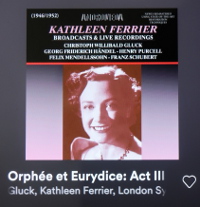
With her ability to make so joyful both the religious and the secular it was Kathleen Ferrier who crossed best between the saint and the fairy
Et j'ai deux fois vainqueur traversé l'Achéron/
Modulant tour à tour sur la lyre d'Orphée/
Les soupirs de la Sainte et les cris de la Fée
but there is such a strong streak of Romanticism in Taylor Swift's lyrics that she should be the Romantic poet.
Just listen to the lakes - original version.
March 2020
Here, we have never been bothered about next fortnight's ticket sales, which event horizon is the extent of much PR longevity and digestibility and a lot of the coverage. Just at the moment, with Covid-19 rampant there are no next fortnight's ticket sales.
No - rather the intention is to address the semi-permanent reputation of subjects. Since there are not many reviews and we are there for the long term - we are already 20 years old - any review is likely to be to read in the hundreds of thousands of times over the years and, because we know how to do it, hands down the chances are we would win a PR fracas in the end.
Fortunately, we do not choose artistic subjects to be hostile to (there are enough political targets to choose from if we were into hostility).
With increasingly few publications of record around and with so many internet properties having folded in the lifetime of our own (Compuserve, Lycos, Geocities, the list goes on) there is also a strong possibility that some social media will disappear from public accessibility (some already have), losing or hiding the whole record of work of artists almost completely and meaning their history is not covered.
The same problem exists for artists having entrusted publicists totally in the management of their material. These may not archive material they take down, which in retrospect may be the best material, or they may cease to represent them or they may fold. In each case the artist may lose high quality material like videos.
As it happens we are well archived by others but that is not to push this site. We are into a low volume of reviews.
What we may be saying is that real critics, however fanciful the opinions of some are, may be the ones who safeguard reputation and so there is a need for more of them.
There is a limited amount of academic coverage as well but once something becomes academic it may also become at some removes.
What we are also saying is that in this time when live music is suspended and recording studios largely shut, the tape you have in your cupboard may be the source of tracks you can release and which people want to listen to.
November - December 2021
There are compelling reasons not to allow social media to determine how people communicate.
Facebook now fails musicians and advertisers who wish to relate to music.
For the 60% of the world that do not have Facebook accounts there is now no meaningful information available on it about them.
It has stopped being the go to place for information about them.
Google used to be spectacularly good for search. No more. The bubbles that Google search puts round individual users is akin to censorship. There is little historical information that users find about musicians except from links to competitors like Wikipedia or lyrics sites.
More results displayed for everyone would stop them eating Google's lunch. Bland and meaningless search results seem to be trend, though.
As you only get 10 or less search results from Google, since Facebook's change of policy to being a closed garden, if you search for a musician, there is a good probability that no Facebook page now shows in the results. So be it.
So to keep the immediate score we all turn to releases on Spotify, the dominant streamer, from which Taylor Swift once won better terms, and the user data it provides about music.
Spotify tells me without asking that I have listened to just over 2000 artists during a year, for Alphabet internet properties it will be a tenth of this and on Facebook (now Meta) properties in single figures.
To all intents and purposes musicians must now pay for publicity on Facebook. From Spotify they will get both publicity from being heard and revenues though the latter may be considered meagre. On Alphabet's YouTube some videos may deliver even more meagre per stream revenues though the publicity is generally more substantial.
As many musicians do not have good communication strategies away from social media it will be hard to arrest falling artist revenues even if impediments to touring fall away.
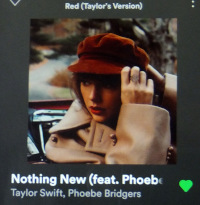
*****
Artists traditionally had different means of communication.
So, too, did critics. It would have been unwise to entrust text, or even communication, to social media. You do not own what is there in any meaningful sense.
It is a pity though. Ordinary folk used to be dependent, too dependent, on their workplace for projection of who they were beyond their immediate circle, presuming always their workplace allowed them to project at all.
Facebook for a decade played a stellar role in breaking down that old order. People could reach far and wide on a universally known platform.
From November 2021 it is calling time on that. It is in harvesting mode, ex-growth, and staking much on the metaverse.
On Google, too, you could enter someone's name and find them. Not really so now. It, too, is in harvesting mode.
Profits of these businesses will hold up for now but they are no longer amongst the players you have to reckon with for change. Coronavirus is, and has changed the rules. For artists, for sure.
*****
With war succeeding coronavirus in 2022 prevailing sentiments in capitalism are changing, too.
With so much inflation you are not going to balance the books with just more deception of the buyer. Artist authenticity is called for.
Art should try and lead the charge.
Summer 2022
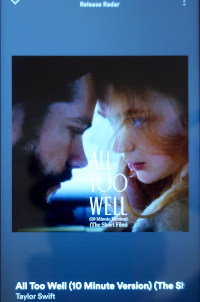
A well made piece of music for 2022
On top of which her voice has become a joy to listen to of late.
Deeper, better across the range, excellent in execution and with the confidence of someone with nothing to prove in this discipline. Very promising!
Autumn 2022
And she has just won two MTV awards for this long form video so well done Taylor and looking forward to the October album .... and maybe it's not too shabby being a critic who calls it right.
October 2022
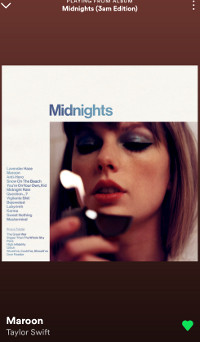
redshift
not grey [3]
"Midnights is a collage of intensity, highs and lows and ebbs and flows."
Bring it on.
January 2023
She is from the age of individuals, too.
May - July 2023
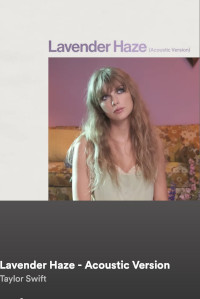 I like it and the
colour sense.
I like it and the
colour sense.
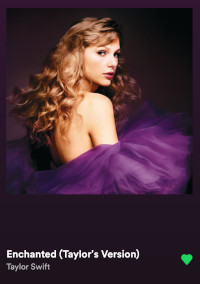 Purple patch
Purple patch
*****
STARS FELL ON ALABAMA
Reviewed by ANDRE BEAUMONT
The artificial intelligence of YouTube and Spotify seems to know what I have been writing about here and feed me related videos and tracks, within minutes in the former case.
YouTube directly targets what you want to see whilst Spotify tries to lead you astray by extending the range of music you listen to, or so it seems.
I listen to a fair amount of classic country music so it was no surprise to find Tara Nevins' folk-rock Stars Fell on Alabama in Spotify's feed of music that keeps on trying to push you out of a genre.
Except I liked this one a lot and came back to it.
Then I twigged - Stars Fell on Alabama is the jazz standard from 1934 and has been recorded by numerous artists.
Tara Nevins' fiddle playing and vocal delivery makes her version almost threatening rather than the sugary, romantic sound of some other recordings and I like that - it acquires some of the grittiness and realism of country music. The timbre of her voice in this song and the pace helps this along.
Exploring a little I found that Tara Nevins is known only for this track on this side of the pond - she is a performer at, and organizer of, American festivals.
For Stars Fell on Alabama there is the atmospheric 1934 Jack Teagarden/Benny Goodman version.
There is the Renee Olstead solo and the Ella Fitzgerald/Louis Armstrong duet.
Instrumental only versions include those by Harry Connick, Jr, Stan Getz, Toots Thielemans and John Coltrane.
Tara Nevins' track is a real innovation and a worthy addition to the canon of interpretations of this song.
Like Janis Joplin's Summertime, the emotions conjured are different from those intended by the original songwriter. (Joplin did not irrevocably change everyone's songs. Whilst Kris Kristofferson's Sunday Morning Coming Down was unquestionably better sung by him than by anyone else, Janis Joplin's unstressed delivery of Me and Bobby McGee keeps close enough to the original in musical and emotional terms for it to be, probably, the reference version for a female interpretation. Watch the biopic, Janis Little Girl Blue, for Kristofferson's delighted reaction.)
I would take Tara Nevins' version ahead of the Vera Lynn and Frank Sinatra ones, for all their relative polish.
___________________________________________________________________________
Making Tracks
Emmylou Harris' Red Dirt Girl makes an allusion to stars falling on Alabama in the lyrics.
Her dog, Bella, is immortalised in her song, Big Black Dog, just as Picasso's dog, Lump, is in a book of photographs of the two together by David Douglas Duncan, PICASSO & LUMP Une histoire d'amour.
It closes with this inscription:
Amigos à toujours
Pour toujours
Picasso
1881-1973
Lump
1956-1973
That would be the end of the picture but Kris Kristofferson can be heard as the voice of a dog, Gabriel, in the 2017 film, Best Friend From Heaven.
*****
June 2018
David Douglas Duncan died earlier this month at the age of 102. At the Picasso Museum in Antibes there is a Picasso line painted collage, which also appears on the cover of Boris Friedewald's book, Picasso's Animals, for which Duncan wrote a foreword, of a owl with the eyes cut out to show Picasso's eyes, photographed by Duncan, staring out and is signed:
pour
Duncan
Picasso
So the compliment in this painting was returned in the inscription in PICASSO & LUMP and, indeed, they were all three amigos à toujours as Duncan, not knowing him, knocked on his door in 1956 and remained friends with him till his death in 1973, the same lifespan as Lump.
The eyes have it. Gloom is out. Photo-manipulation is out. Picasso was much more joyful.
*****
July 2019
Picasso has some competition as an animal lover, of dogs and owls included.
____________________________________________________________________________
May 2022
Matthew Arnold had the idea that:
It is the business of the critical power .... "in all branches of knowledge, theology, philosophy, history, art, science to see the object as in itself it really is." .... It tends to establish an order of ideas, if not absolutely true, yet true by comparison with that which it displaces; to make the best ideas prevail.
He also made a distinction between the practical and politics, as a separate discipline, and art.
His function of criticism gave the tools to rank artists in terms of enduring greatness.
He had the luxury of ranking poets and literary figures who in the main were already dead.
They, too, had that luxury.
They only had to be read by him.
I am perfectly happy with musicians who wish to be treated as if they were dead, indifferent to what is said of them. It is preferable that they themselves say that they are dead rather than through a third party.
The 21st century problem is that agents, managers, producers, publicity agents and rights owners make representations as if their musicians signed up as zombies, representations of no artistic merit and at least one remove from art, containing more falsehood than truth. Sometimes this is so intense that it suppresses most truth and that may even be the intention.
This is an interference in the function of criticism and, at times, goes overboard marking it out as interference in the freedom of the press.
At some point, most points, the art must speak for itself and, if the artists wish, they can shed light on it themselves. If not it cannot be ranked for greatness in the medium term though it might be for some practical metric.
So sometimes, typically in mid-career, either the work bores us silly (which may not be the fault of the musician but the producer) or the representations made about the artist bore us silly resulting in no particular ranking or push for posterity by the critic. It usually is the latter.
This representation, this spin, destroys the financial interests it thinks it is engaged for, preventing the purchaser understanding the artist. It is the long, withdrawing roar, the antithesis of the critical power, the enemy of artistic integrity, the premature destroyer of artistic reputation.
Any critic will have seen it somewhere. Switch off the soundtracks and the latest videos look for all the world like hostage videos. Earlier historic videos disappear. Faked or heavily influenced interviews appear. Or the Facebook pages and Spotify profiles that used to give charming, if often wisely infrequent, insights into the artistic mindset suddenly become mindblowingly bland and unartistic. Nothing properly represents the artist anymore. Nothing sells.
Sometimes veterans explode in anger at it all as in this week's You Will Never Work in Television Again. This may be wise business; a million listens a day for an unmediated, unpromoted, pop up band.
PRISMA's I Never Wanted to Meet You is their hit. They are not veterans at all.
There is a new turn in capitalism and the old set do not realise it yet. Malicious lying for supposed commercial advantage is delivering consequences for perpetrators that cannot be halted.
[20 August 2022 In some juridictions those producing fakes - interviews, art, music, publications - with what purports to be AI are probably vitiating their contracts with the real artists given the depth of misrepresentation. They are undermining a mainstay of capitalism - the contract. They cannot undermine capital itself; they are undermining its legal right to make a return. The compensation they may find themselves being ordered to pay is capital. You cannot fake it until you become it with 'AI'. You fake it until you lose your shirt. They are not producing art or criticism of art. They are not creating a positive personal or business reputation. They are undermining business].
1 June 2022
So suddenly all the expensive work of publicity agents to promote the client on Facebook and Instagram becomes valueless as the number of followers falls by three orders of magnitude with no route to recovery because Meta has taken back what it imagines it has given: free publicity. Artists must now pay to reach their own followers and Facebook no longer does what it said on the tin: connect people.
The problem will exist in other artistic disciplines, it is not unique to music: [1]
The lack of authenticity grates more for these very competent critics than the changes in format: [2]
A more striking realisation, however, has emerged about capitalism. The revolution was never going to come by an organised proletariat rising up. No one much is interested in that when Gen Z, a less obedient generation than its two predecessors, is more enthralled by the individualistic thrill of gaming.
The big change is that it is dawning on the world that contracts, the legal mainstay of capitalism to date, do not benefit people. They want unenforceable contracts if they are to have them at all. This has been given two shots in the arm, like innoculation, by civil courts over the world being snarled up by coronavirus and by the sudden repudiation of contracts because of war. Fear of many contracts has gone to be replaced by dislike.
Whether it is employment contracts, marriage contracts (in Britain it is a more bizarre and unappealing contract than in most jurisdictions) or management contracts (all three types are anachronistic), people now want reasonableness and fair play to be the main glue that holds their continuance in place; otherwise a relatively unlegalistic parting of ways.
There are other areas, like intellectual property, that are as yet mainly unaffected by this but most of the business models in music are broken. Only legacy ownership and streaming are viable at the moment.
So the critics sit by the wayside, observing and wondering what will come next.
Maybe art will lead the way.
*****
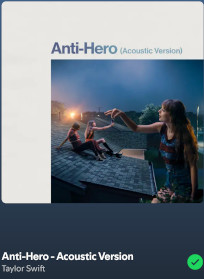
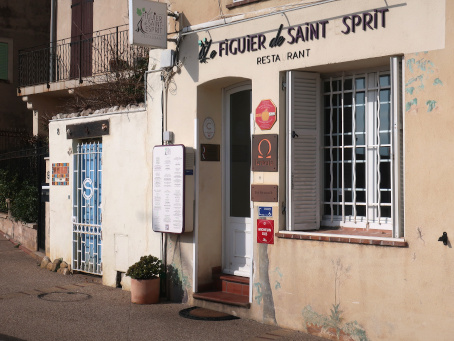
Change the S for a T , that wll do it